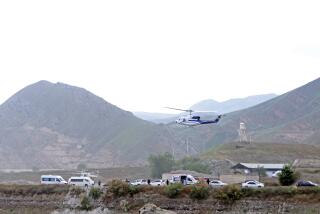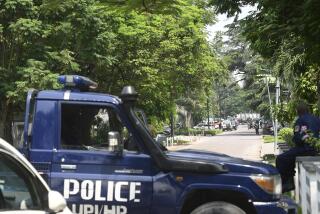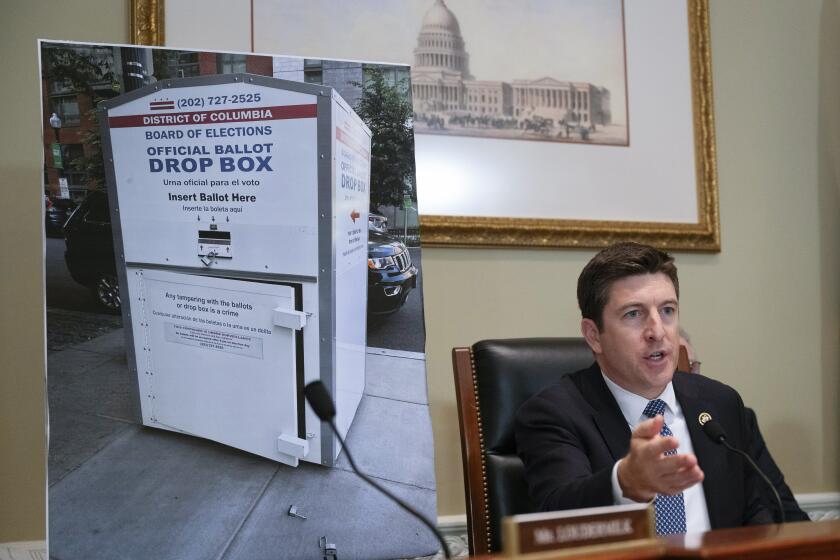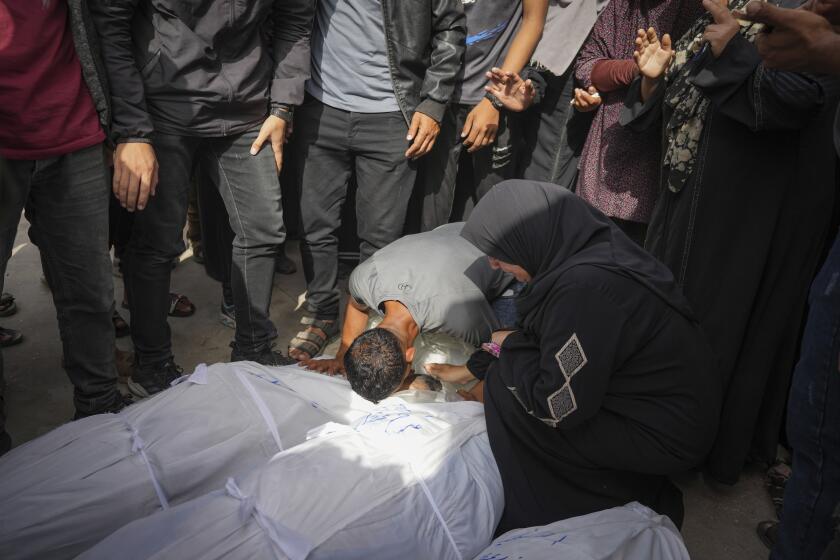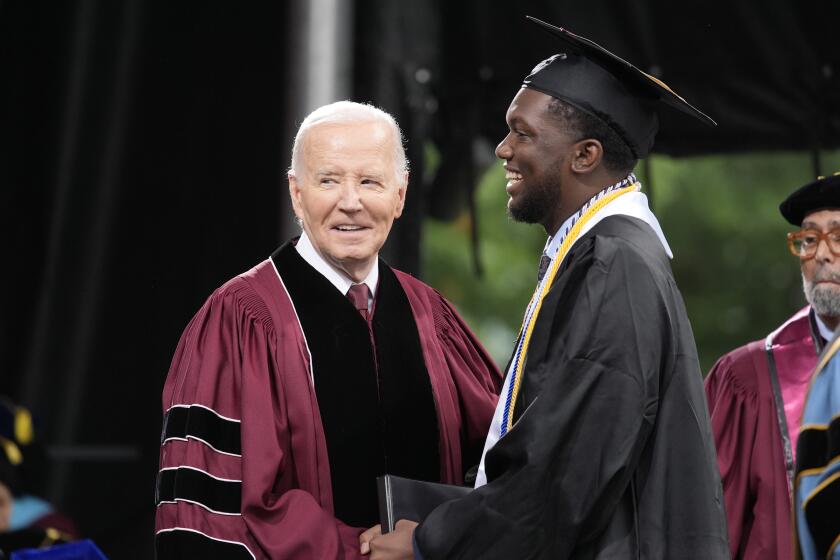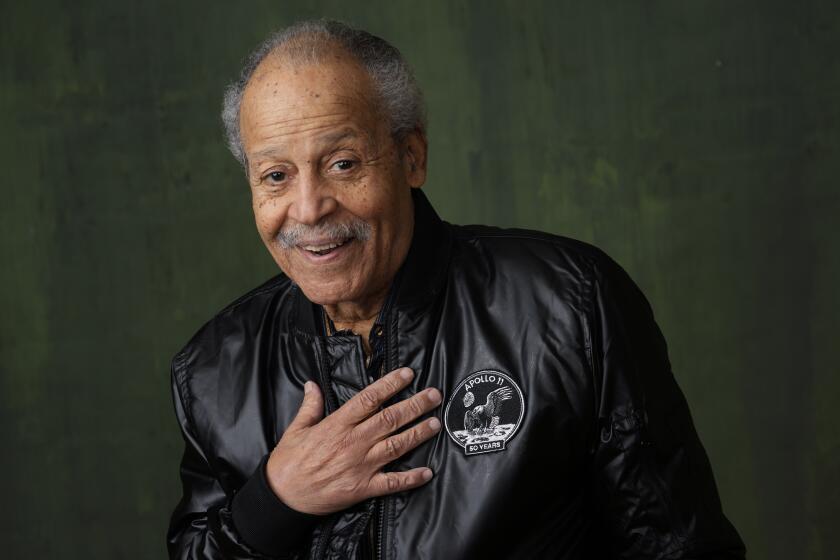Saudi Prince Warns Bush to Rein In Israel
Crown Prince Abdullah of Saudi Arabia delivered a stern warning to President Bush on Thursday that the United States would face what a top Saudi advisor said were “grave consequences” if it does not rein in Israel.
Abdullah, the de facto ruler of the desert kingdom, spent five hours at Bush’s ranch in central Texas, the informality of the setting barely masking the divisions in Washington’s relations with one of its most important Middle East partners.
Bush, offering an upbeat account after the meeting, said the United States and Saudi Arabia shared a vision of Israelis and Palestinians living in peace. He said he and Abdullah had “established a strong personal bond.”
He also said the Saudis had made it clear “that they will not use oil as a weapon” in Middle East diplomacy. Abdullah’s advisor, Adel Jubeir, confirmed the pledge.
“I appreciate that, respect that, and expect that to be the case,” Bush added.
The meeting, scheduled more than a month ago, took on increasing importance by the day amid the Israeli-Palestinian violence. During the last six weeks, Palestinian militants repeatedly engaged in suicide bombings and Israeli Prime Minister Ariel Sharon dispatched troops to occupy Palestinian territory in the West Bank. Since March 29, Israeli troops have confined Palestinian Authority President Yasser Arafat to a small corner of his headquarters in the city of Ramallah.
Reporting on Abdullah’s sharp-edged message to Bush, Jubeir, the crown prince’s foreign policy aide, said: “If Sharon is left to his own devices, he will drag the region over a cliff, and that does not serve America’s interest and it does not serve Saudi Arabia’s interest.”
“If the United States doesn’t do more to reduce the violence,” he said Abdullah told Bush, “there will be grave consequences for the U.S. and its interests.”
He did not elaborate on what the consequences would be. Nor did the Saudis say publicly what more they want the U.S. to do to influence Sharon’s policies.
However, the U.S.-Saudi relationship, nurtured over many decades, is built on Saudi oil, American weapons and a recognition that each country needs the other--not just for economic reasons but also for maintaining stability in the inflamed Middle East.
The United States buys 1.7 million barrels of Saudi oil a day, more than twice the amount of 15 years ago, and is Saudi Arabia’s biggest customer.
The Saudis in turn buy more American weapons than anyone else--$39 billion in purchases in the 1990s, a figure that in some cases has kept individual U.S. businesses from going under.
Jubeir said Saudi Arabia did not see oil as a weapon to be wielded in its foreign policy battles.
“Oil is not a tank. You cannot fire oil,” he said, pointing the thumb and forefinger of each hand as though they were pistols.
Bush and Abdullah are known for speaking bluntly, and Jubeir said the crown prince did little to hide his growing dismay with the failure of the United States to exert some muscle on Sharon.
“He’s direct and sincere and he doesn’t mince his words--like the president,” he said of Abdullah.
Speaking with reporters after Abdullah left the ranch, Bush said, as he has in the past, that the Palestinian Authority must do more to end terrorist attacks, and Israel must complete its withdrawal from the territory it has recently occupied. He said Israel must end the standoffs in Ramallah and Bethlehem, where its troops have besieged Palestinian gunmen, civilians and others in the Church of the Nativity.
The president said he and the crown prince, who left without speaking to journalists, had agreed that “the world must join in offering humanitarian aid to the many innocent Palestinians who are suffering.”
Though the meeting was drawn up with a wide agenda, reflecting the reach of the U.S.-Saudi relationship, the accounts by Bush and a senior administration official made it clear that the discussion was monopolized by the efforts to calm the latest Middle East tensions.
Asked whether Bush had assured Abdullah that he would put more pressure on Israel, the senior U.S. official, speaking on the condition of anonymity, said, “The president talked again with the crown prince about the responsibilities of all the parties” in the region.
The official, offering an account that differed in tone from that of the Saudi advisor, said Abdullah “expressed nothing as a threat to U.S.-Saudi relations.”
The talks have been among the most anxiously awaited of the Bush administration. Relations between the two countries, often skittish, have been more on edge since the Sept. 11 attacks; 15 of the 19 suspected hijackers were Saudis.
More recently, a Saudi telethon for the Palestinian cause drew widespread criticism in the U.S. By some accounts, it raised about $100 million--some of it going to the families of suicide bombers. The senior U.S. official said that while Bush and Abdullah met privately, the U.S. delegation questioned Saudi Foreign Minister Prince Saud al Faisal “about what had been going on here.”
The Saudis responded, the aide said, that the money was being used for humanitarian needs and that they distinguished it from the help officials say Iraqi President Saddam Hussein has given to families whose children are suicide bombers.
Abdullah had twice put off visiting Bush, to show his displeasure with the U.S. president’s failure to become more engaged in seeking a settlement between Israel and the Palestinians.
He finally accepted an invitation in mid-March when Vice President Dick Cheney visited him in Jidda. At that time, Abdullah was advancing his own recipe for peace, Bush had come to recognize that he could not avoid the conflict, and the U.S. was seeking allies for an expansion of the war on terrorism, possibly targeting Iraq.
In the Saudi view, the Bush administration’s reputation has been called into question in the region because Israel ignored the president’s April 4 call to completely withdraw from the West Bank.
Abdullah has been Saudi Arabia’s day-to-day ruler since King Fahd, his half-brother, suffered a stroke in 1995. The crown prince sponsored the recent Arab League offer for normal relations with Israel in return for an Israeli withdrawal from territory it has occupied since the 1967 Middle East war.
Bush uses a visit to his 1,600-acre Prairie Chapel Ranch as a plum held out to only the most important foreign leaders. Since taking office, he has played host there to President Vladimir V. Putin of Russia and Prime Minister Tony Blair of Britain.
Abdullah arrived for the meeting 10 minutes late, accompanied by Secretary of State Colin L. Powell. The foreign minister and the Saudi ambassador to the United States, Prince Bandar ibn Sultan, were in a trailing limousine. Cheney and other senior officials were already at the ranch. The president greeted Abdullah just outside the front door of the ranch house.
They met privately for about 75 minutes, with only a translator present, the White House said. Later, they toured the spread, its grasses growing green, the canyons hiding wildlife, the bluebonnets and pink poppies in bloom.
“He’s a man who’s got a farm and he understands the land,” Bush said, “and I really took great delight in being able to drive him around in a pickup truck and showing him the trees and my favorite spots. And we saw a wild turkey, which was good.”
“We spent a lot of time alone, discussing our respective visions, talking about our families,” he added. Throughout the day, Bush referred to the crown prince as “your royal highness.”
More to Read
Start your day right
Sign up for Essential California for news, features and recommendations from the L.A. Times and beyond in your inbox six days a week.
You may occasionally receive promotional content from the Los Angeles Times.
